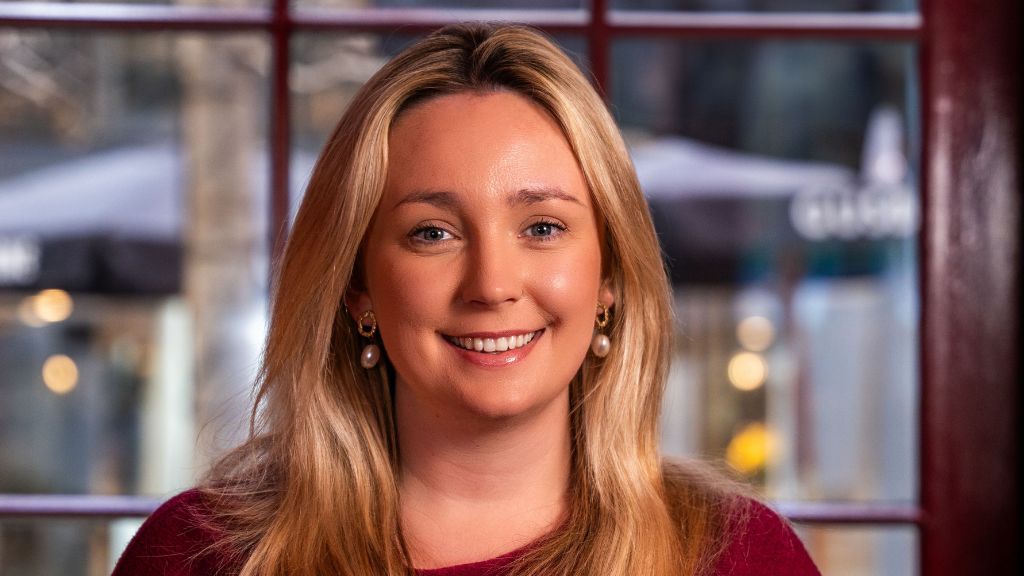Leader’s spotlight: Enriching lives

Chief operating officer Sarah Clarke-Kuehn explains to Lee Peart how Sanctuary Care’s Enriching Lives framework helps deliver high-quality, person-led care to residents while enabling staff to feel valued and fulfilled.
The Enriching Lives framework came about because we wanted to commit to ensuring that our vision and values were more than just words,” Clarke-Kuehn says. “We really wanted to see our mission of enriching lives as that golden thread that runs through everything we do. It has to become central to how we engage with all our residents, their families and, equally as importantly, how we treat our teams.”
Based on research by Sheffield University academic Mike Nolan in 2006, the framework is based around fulfilling the six enriching life senses of: security, belonging, continuity, a sense of purpose, achievement and significance.
“It gives us a common vocabulary and understanding of how we can articulate to people what enriching lives means for our staff, their residents and their families,” Clarke-Kuehn says.
Embedding the framework into the lives of residents starts at the beginning of their care journey. “It’s part of our move-in process and that then helps us to work with the residents and their families to ensure that we really understand who they are so that they get the best quality of life that is truly tailored to their individual needs,” the chief operating officer says. Each resident is given a summary of the framework, including Sanctuary Care’s commitment to helping them to live an enriched life, in their move-in pack.
“It explains how a sense of security means to feel safe, belonging and part of something with a sense of continuity,” Clarke-Kuehn says. “We need to make sure they can carry on with the things that are important to them. People need to have a sense of purpose and maintain their personal goals and a sense of achievement. We need to keep asking how we can make people progress towards those goals and have a sense of significance.”
In 2021 Sanctuary Care commissioned Research Works to gather residents’ views in England and Scotland on what had helped them to achieve their six senses.
“The new research helped cement what we already knew and enabled us to develop our feedback mechanisms because that’s so important when you are trying to deliver the highest-quality care and enrich the lives of residents,” Clarke-Kuehn says.
“The survey has also allowed us to put the Enriching Lives framework into our care reviews so that we have conversations with our residents and their families about what’s important to them.
“It really is about going beyond the highest-quality level of care. It’s almost taking person-centred care to the next level to ‘person-led care’ so that the resident is driving the things that they want because they are important to them and are tailored and specific to them.”
Clarke-Kuehn highlights some “amazing examples” of how staff had helped residents live enriched lives by achieving things that are important to them.
“At Ravenhurst we have a retired music teacher who has started her own choir because that sense of continuity was so important to her and she wanted to achieve and have some significance.”
“At Ravenhurst we have a retired music teacher who has started her own choir because that sense of continuity was so important to her and she wanted to achieve and have some significance,” she notes.
“That continuation of the significance of creating a choir and this beautiful musical presence in one of our homes was so amazing to see.”
In another example, a resident at a care home in Castlecroft in the West Midlands was able to regain his passion for rugby after staff helped him to become a coach and chair of a local junior team.
Throughout Sanctuary’s care homes residents who are keen gardeners have been able to become garden assistants. “They now have a purpose and a sense of continuity and achievement,” Clarke-Kuehn notes.
A ‘Grow it, cook it’ programme has been a big hit with residents since its launch in mid-2022. “We have been getting residents who have a passion for gardening and cooking out helping us grow vegetables and be involved in the meal experience,” Clarke-Kuehn says. “They’ve been able to cook meals with our chefs and have been able to enjoy and celebrate this achievement as a collective home. They have grown it, eaten it and thoroughly enjoyed the whole experience.”
In another example, Sanctuary Care granted a resident’s wish to have his own purpose-built gym. “The gym was originally intended for him and his use, but we have more residents and even staff members using it now, so it was a way that they have all really come together,” Clarke-Kuehn says. “Staff spent time getting to know that one resident and what was really important to him, as well as using the gym to enrich more people’s lives.”
Food and nutrition is a further core component of delivering the highest- quality care to residents. “We’ve got some fantastic chefs and catering staff and being involved in the whole experience of delivering, creating and eating food together has such an important ethos in terms of creating a sense of belonging and significance for all our residents,” Clarke-Kuehn says.
The lives of staff are also enriched through an annual MasterChef competition where the provider’s talented chefs come together to show off their culinary skills.
“That recognition of how good they are among their peer group shows we appreciate them and gives them such purpose and significance in the role they play in our care homes,” Clarke- Kuehn says.
Enriching Lives has also given Sanctuary Care a framework for supporting staff through their wellbeing, recognition, job satisfaction and career development.
“It plays a really crucial part in having the best staff you can possibly have,” Clarke-Kuehn explains. “One of the benefits of being a not-for-profit is we have a huge opportunity to reinvest in our employees in terms of training and development.”
The not-for-profit is also focused on providing support for the wellbeing and mental resilience of staff. The business has partnered with a mental health guru on mental health resilience training which has already been offered to around 1,500 staff.
“We also have an employee assistance programme for people who need help with legal or CBT [cognitive behavioural therapy] mental health issues,” Clarke-Kuehn adds.
Further support is provided in the area of learning and development.
“We have a fantastic learning and development offering and career
pathways with nationally recognised qualifications so that if people want to develop the opportunities are there,” Clarke-Kuehn says.
The chief operating officer says Sanctuary offers a “really competitive package with sick pay, life insurance and contributory pensions” as well as a new clinical strategy which encourages everyone within a care home to look at development opportunities in a clinical pathway.
“We have a whole home approach in terms of being able to support everybody in terms of their career aspirations,” Clarke-Kuehn says.
The chief operating officer adds that all staff are paid well above the National Minimum Wage. With more than 7,000 staff Clarke- Kuehn says Sanctuary Care is “not immune” from the current recruitment crisis facing the sector, but notes that recruitment and retention is better than the sector average.
“I do think that is due to our ethos and our values,” Clarke-Kuehn says. “Enriching Lives is part of that ethos and those values. We’re able to reinvest in fantastic rest rooms and opportunities for our staff to look after their wellbeing. Care is a fantastically rewarding job, but it is also a hard job and we have to be honest.
“That ethos of looking after our staff as we look after our residents really resonates with them. We offer competitive terms and conditions and feel we have gone that bit further on our development offers and career pathways and access to qualifications.”
Technology is a further core component to how Sanctuary Care enriches the lives of residents and staff. The not-for-profit has invested a “significant amount” in tech in recent years, including the roll-out of its own, bespoke electronic care planning system.
“Technology is really important to Sanctuary Care,” Clarke-Kuehn notes. “We have always had a technology-led desire. I want our staff to be spending time with residents, not doing paperwork, and delivering the quality care you can deliver when you are on the ground and engaging.
“If we can make the admin simple, straightforward and interlinked, we can allow our staff to spend more time with residents and make sure that golden thread of enriching lives goes through everything.”
The chief operating officer says Sanctuary is in the “early stages” of trialling the interaction of its care planning system with Atlas emar software.
The not-for-profit has also invested in magic tables featuring interactive light games to provide physical and mental stimulation for residents living with dementia.
Looking ahead, the chief operating officer says it is important for providers to continue to play their role in promoting the career opportunities available in the sector.
“There’s a positivity about all providers talking about a career in care rather than it just being a job,” she says. “That’s the message we have to get out there. You can join as a care assistant and work your way up through the career paths. You may change your career paths. You might start on a non- clinical pathway and complete a nurse associate programme and qualify as a nurse.
“There are huge opportunities in care for a career if that’s what you want, or you can be the best care assistant you ever want to be. People will find their own opportunities in Sanctuary Care whether that’s as a career or being the best person they can be in that particular job.”
With 60% of Sanctuary Care’s homes funded by 47 local authorities,
Clarke-Kuehn acknowledges the current challenging funding climate, but adds the not-for-profit is still able to maintain a level of investment she is proud of.
“We will find out about fee levels for the coming year in March,” the chief operating officer notes. “We want to deliver high-quality care, so we need to see a long-term trajectory for that and we are working really closely with our local authorities to make sure that we all understand the appropriate level of cost and fee for delivering high-quality care.
“We need a certainty so that we can plan and ensure that we are reinvesting and building new properties. Everybody is looking for that longer- term direction. It’s an incredibly difficult time for everybody at the moment.
“There are lots of pulls on the government purse strings. For me, we need a sense of direction. We need that five-year plan and we need it delivered because there are some incredible providers out there who can work to deliver the solution. We need to have the vision and then we can make it work.
“ICSs have to work and social care has to be at the right place for that integrated care solution to work whether that’s at an ICB, ICP or ICS level. Providers need to be at those tables.”




